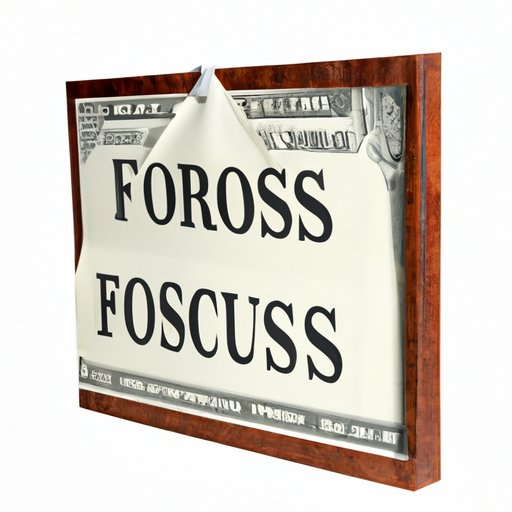Introduction
Foreclosed homes can be an excellent option for buyers looking to purchase a property at a lower price. However, finding and purchasing a foreclosed property can be a complicated process. In this article, we will offer a step-by-step guide to finding foreclosure listings, discuss the pros and cons of buying a foreclosed home, and offer advice on how to evaluate whether a foreclosure is the right choice for you.
A Step-by-Step Guide to Finding Foreclosed Homes in Your Area
The first step in finding a foreclosed property is to search for listings in your area. There are a few ways to do this, including using online databases like Zillow, Trulia, and Foreclosure.com. It’s also possible to find listings by visiting your local courthouse or working with a real estate agent.
When searching for foreclosed homes online, it’s essential to use filters to narrow your search. For example, you can exclude listings that are currently in foreclosure but not yet listed for sale. You can also filter based on the type of property and price range.
If you choose to visit your local courthouse, you can find foreclosure listings in the public records section. It’s essential to check the latest listings as they may not be available online yet.
Working with a real estate agent who is experienced in dealing with foreclosed properties can also be helpful. They can assist you in navigating the complex process and connect you with properties that meet your requirements.
No matter which method you choose, it’s important to be patient and persistent, as the process can take time.
The Pros and Cons of Buying a Foreclosed Home
Buying a foreclosed property can be a great option for buyers looking to save money. Foreclosed homes are usually priced below market value, making them more affordable. However, there are risks and challenges to consider when purchasing a foreclosure.
One of the main benefits of buying a foreclosed property is the potential for a lower purchase price. Additionally, foreclosed homes are often sold “as is,” which means buyers can negotiate a lower price to cover any required repairs.
Despite these advantages, buying a foreclosed property can have some challenges. Many foreclosed homes require significant repairs, which can be costly. Additionally, the process of buying a foreclosed home can be more complicated than purchasing a traditional property.
Before deciding to buy a foreclosed property, it’s essential to evaluate your options carefully. Consider factors like the condition of the property, the cost of repairs, and the potential resale value.
What to Know Before Making an Offer on a Foreclosed Home
Before submitting an offer on a foreclosed property, it’s crucial to understand the legal and financial implications of the purchase. For example, banks may impose certain stipulations on the sale, such as requiring the buyer to pay back taxes or forbidding them from reselling the property for a certain period.
Additionally, there is a risk of bidding wars when purchasing a foreclosed property. Multiple buyers may be interested in the same property, driving up the price. It’s essential to establish a budget before submitting an offer and be prepared to walk away if the price becomes too high.
It’s also crucial to have financing in place before submitting an offer. Many banks require buyers to provide proof of funds or pre-approval for a mortgage before considering their offer.
Foreclosed Homes vs. Short Sales: Which is the Right Choice for You?
Another option to consider when purchasing a property is a short sale. Unlike foreclosed properties, short sales are sold by the homeowner rather than the bank. While short sales can offer buyers a lower purchase price, the process can be even more complicated than purchasing a foreclosed property.
When considering the choice between a foreclosed property and a short sale, it’s important to evaluate the pros and cons of each option carefully. For example, foreclosed properties are typically priced lower than short sales, but they may require significant repairs. Short sales, on the other hand, may be in better condition but can take longer to complete the purchase process.
10 Tips for Successfully Flipping Foreclosed Homes
Flipping foreclosed homes can be a potentially lucrative investment. However, it’s essential to approach the process carefully and have a solid plan in place. Here are ten tips for successfully flipping foreclosed properties:
- Do your research before purchasing a property to ensure it’s a good investment
- Assess the repair needs and budget accordingly
- Find a contractor who can complete the repairs in a timely and cost-effective manner
- Consider staging the property to make it more appealing to potential buyers
- Price the property competitively to attract buyers but still allow for a profit
- Market the property effectively, including high-quality photos and detailed descriptions
- Respond promptly to inquiries from potential buyers
- Be prepared to negotiate with potential buyers
- Work with a real estate agent who is experienced in flipping properties
- Be patient and persistent – flipping properties can take time and effort.
Conclusion
Finding and purchasing a foreclosed property can be a complicated process, but the potential for lower purchase prices and significant returns can make it worthwhile. It’s essential to approach the process carefully, do your research, and evaluate your options to find the right property for your needs. With diligence and persistence, you can find the right foreclosed property and make an excellent investment.
